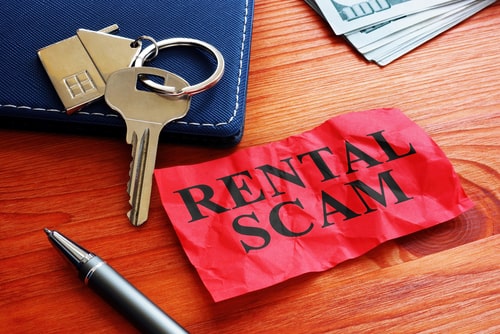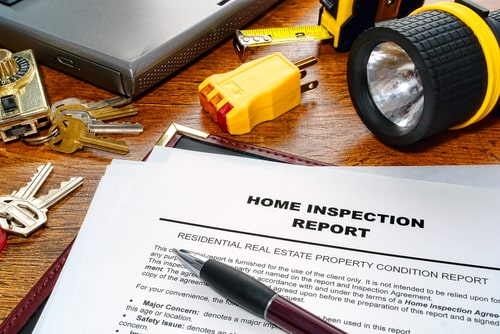For as long as the rental industry has been around, scammers have been looking to take advantage of both landlords and tenants. Whether you are searching for or listing an apartment to rent, understanding the potential for scams will help keep you protected. So, join us below as we discuss common tenant scams, what to do if you are the victim of a scam, and, more importantly, how to recognize and avoid them!

Common Tenant Scams to Watch for When Looking for a Rental
It is unfortunate but common to encounter fake ads and scammers when searching for a new rental home. That said, the fact that most apartment searches begin online makes it even easier for fraudulent actions. Therefore, to avoid becoming the victim of a crime, pay close attention to the common tenant scams and warning signs below –

- Details are Vague at Best
- Too Good to be True Pricing
- Photos Include Watermarks
- Exact Duplication
- In-Person Showings Not an Option
- Let’s Make a Deal ASAP
Details are Vague at Best
While not a surefire sign of tenant scams, listings with vague detail and little information are definite red flags. That said, this could prove that the landlord is just not a great writer, or it is vague because the lister has never seen the actual unit. Furthermore, if what little information provided is riddled with punctuation or grammatical errors, this is a problem. So, if there is a minimal description along with other warning signs such as poor quality or nonexistent photos and missing or incomplete address, renters beware!
Too Good to be True Pricing
They say if something seems too good to be true, it probably is, and that applies to rental scams as well. That said, any listing priced well below the local competition should immediately arouse a bit of suspicion. When this occurs, there could be three possible explanations, either the landlord does not know the value of their home, is trying to do a bait and switch, or is a fraud. Scammers use this tactic to get prospects to sign and pay quickly to “lock in the deal.”
Photos Include Watermarks
One thing to note about online rental listings is that they are incredibly easy to duplicate and steal. That said, a well-known trick to recognize a potentially fraudulent listing is through the use of MLS watermarked photos. Therefore, when you see these watermarked photos, it signals that the lister may not have access to the originals.
Exact Duplication
As we mentioned above, it is very easy for scammers to steal online listings. One of the common tricks is to copy the property description to the letter and then change the contact information. Thus, rerouting prospective leads to them and not the legitimate landlord. The danger is that a renter could appear at the property thinking they had rented it when in reality, they were the victim of fraud.
 In-Person Showings Not an Option
In-Person Showings Not an Option
Even with COVID-19 distancing requirements, landlords still schedule in-person appointments for interested parties. Therefore, if the listing contact is evasive, refuses an in-person tour, or never offers to show you the unit, this is a huge warning sign. True landlords looking to rent their homes will do all they can to accommodate qualified prospects. Even if an in-person tour is unavailable for some reason, they should at least offer an alternative such as a virtual walkthrough.
Let’s Make a Deal ASAP
Any landlord knows that screening applicants is an important part of the rental process they cannot overlook. So, if a landlord seems eager to make a deal and collect funds without doing the usual due diligence, something is shady. Scammers will often try to get individuals to sign a lease and submit funds as soon as possible to secure the unit. When in reality, they only intend to take the money and run. Never wire money to a landlord that says they are temporarily “out of the country.” Additionally, if the owner says they cannot meet and can only mail the keys, run the other way!
Types of Tenant Scams Every Landlord Needs to Watch For
For tenants, coming across fraudulent rental listings is a possibility as they search for their next home. However, scams go both ways, and landlords can also fall victim to tenant scams. These tenant scams can significantly threaten a property owner’s business and financial wellbeing. Let’s review a few examples of these tenant scams against landlords below –
- False Rental Verifications
- Unofficial Credit Reports
- Fraudulent Documents
- Not Disclosing Occupants
- Selling Goods or Operating a Business
- Damage and Fraudulent Reporting
False Rental Verifications
One of the most important parts of applicant qualification is being able to verify previous rental history. However, if a tenant has a poor history or had issues with a prior landlord, why would they want you to find out? Unfortunately, this leads some fraudulent tenants to have associates pose as prior landlords to provide a false reference.
 Unofficial Credit Reports
Unofficial Credit Reports
Checking a prospective tenant’s credit report provides valuable insight into their financial health. Occasionally, a tenant may try and provide landlords with a credit report they have printed. While this may seem convenient at first, it should not be accepted. Remember that once the tenant has a signed lease and keys, removing them from the home requires a costly legal eviction. Therefore, owners must take great care in the qualification screening process. So, always obtain your own current reporting on all applicants.
Fraudulent Documents
A common scam tenants attempt is using fraudulent income verification documents. The danger of taking things at face value is if you approve someone based on incorrect information, the checks may start bouncing once they move in. So, take the time to call employers and verify both the legitimacy and information in the documents provided.
Not Disclosing Occupants
The signed lease agreement should list any tenants as well as additional occupants such as minor children. Therefore, these are the individuals allowed to live there per the legal lease agreement. However, some tenants do not disclose who or how many people they plan to move in. This can cause significant problems for the landlord s they may be occupants that did not go through the proper screening process. Furthermore, you may encounter a person who applied and signed the lease with no intention of ever living there. Instead, they rented the unit for someone else who perhaps would never qualify otherwise. Remember, as a landlord; you have a right to know who will occupy the property.
Selling Goods or Operating a Business
Residential apartment buildings and individual homes are not zoned for business use. That said, most rental lease agreements address the fact that tenants may not use the property for business purposes. For example, a tenant moves into a suburban home and decides to open a daycare. In addition to zoning issues, this presents a security and liability problem for the landlord.
Damage and Fraudulent Reporting
Another example of tenant scams occurs when the tenant causes damage to the unit and then reports the conditions to local housing inspection authorities. By doing so, the tenant will use the condition or housing violations as an excuse to withhold rent. Moreover, the Housing Authority could issue a citation to the owner, further causing stress and money resulting from the tenant’s actions. Regular inspections are one way to help monitor the property’s condition and proactively handle any maintenance issues.

Best Practices to Avoid Tenant Scams
Both tenants and landlords face the risk of scams or fraud throughout the rental process. As a landlord, creating solid business practices to weed out these potential tenant scams is vital. Below we review a few tips to avoiding tenant scams and protecting your valuable investment.
- Thorough Screening
- Avoid Cash Transactions
- Get Everything in Writing
- Say No to Sub-leasing
- Perform Regular Inspections
Thorough Screening
Priority number one is a thorough and robust screening process for every interested applicant. Start by creating a written list of minimum qualifications and screening requirements, and each tenant knows what to expect. Typically, rental screening includes the following –
- Credit Check
- Verification of Income – Roughly 3 times the monthly rent
- Rental History Check
- Criminal Background Report
- Prior Landlord or Professional References
Avoid Cash Transactions
In a rental setting, cash deals raise a red flag. It is not traceable, and there could be issues even if with a receipt. So, as a good business practice, require tenants who insist on cash to purchase a money order instead. Money orders are not a check and are safer than cash, plus they are traceable.
Get Everything in Writing
Whether it is the lease, an addendum, special payment arrangement, or any other agreement, ensure it is thoroughly documented in writing. Verbal agreements open both parties up to misunderstandings and misinterpretation of the information. So, even if you know and trust the tenant, protect yourself and them by taking the time to write up a signable document. It will go a long way in preventing disputes in the future.
Say No to Sub-leasing
Subleasing is when the tenant needs to break the lease but instead finds someone to move in and take over payments. While this serves to get them out of the lease break fees, it is a potential nightmare for landlords. For starters, this means there is an unauthorized occupant in the home who never signed the original lease and did not go through the screening process. So, ensure the lease forbids the tenant from subleasing the unit without explicit consent from the landlord. If this situation comes up during the lease, work with the original tenant to properly screen any incoming occupants.
 Perform Regular Inspections
Perform Regular Inspections
Regular inspections allow landlords to check in on the property, address repair concerns, and perform preventative maintenance. Most landlords agree that semiannual inspections are sufficient. Most landlords plan them during the change of seasons to get the most out of seasonal maintenance. Items such as HVAC system tune-ups help avoid costly emergency repairs during the bitter cold or hot months. Furthermore, if excessive damage is found, owners can address that with the tenant and, if necessary, pursue actions to remove them from the unit.
How Property Management Helps Landlords Avoid Tenant Scams
Choosing to rent out your investment property comes with an inherent amount of risk. However, due diligence along with the right support and processes in place can significantly mitigate these risks. One of the best partners an investor can have is an experienced property management company on their side in the rental industry.
Bay Property Management Group understands the unique challenges rental investors face. Our tried, and true screening processes combined with a legal rental agreement help protect both owners and tenants. Your dedicated property manager will handle all day-to-day operations to provide owners with free time and peace of mind. Give us a call today to find out how a full-service property manager in Philadelphia can benefit your rental business.

 In-Person Showings Not an Option
In-Person Showings Not an Option Unofficial Credit Reports
Unofficial Credit Reports Perform Regular Inspections
Perform Regular Inspections